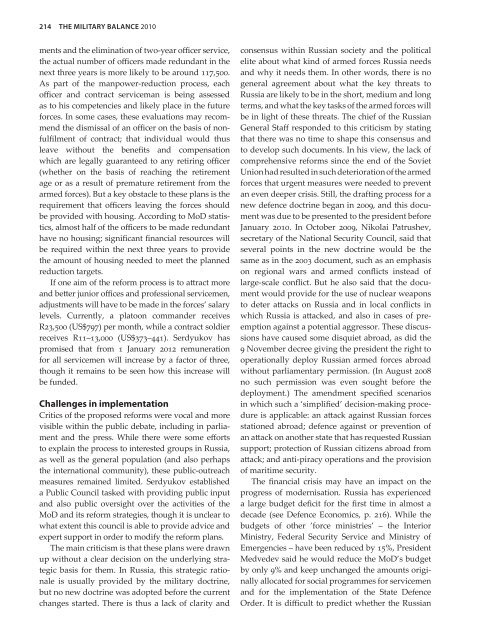Create successful ePaper yourself
Turn your PDF publications into a flip-book with our unique Google optimized e-Paper software.
214 The MiliTaRy Balance 2010<br />
ments and the elimination of two-year officer service,<br />
the actual number of officers made redundant in the<br />
next three years is more likely to be around 117,500.<br />
As part of the manpower-reduction process, each<br />
officer and contract serviceman is being assessed<br />
as to his competencies and likely place in the future<br />
forces. In some cases, these evaluations may recommend<br />
the dismissal of an officer on the basis of non-<br />
fulfilment of contract; that individual would thus<br />
leave without the benefits and compensation<br />
which are legally guaranteed to any retiring officer<br />
(whether on the basis of reaching the retirement<br />
age or as a result of premature retirement from the<br />
armed forces). But a key obstacle to these plans is the<br />
requirement that officers leaving the forces should<br />
be provided with housing. According to MoD statistics,<br />
almost half of the officers to be made redundant<br />
have no housing; significant financial resources will<br />
be required within the next three years to provide<br />
the amount of housing needed to meet the planned<br />
reduction targets.<br />
If one aim of the reform process is to attract more<br />
and better junior offices and professional servicemen,<br />
adjustments will have to be made in the forces’ salary<br />
levels. Currently, a platoon commander receives<br />
R23,500 (US$797) per month, while a contract soldier<br />
receives R11–13,000 (US$373–441). Serdyukov has<br />
promised that from 1 January 2012 remuneration<br />
for all servicemen will increase by a factor of three,<br />
though it remains to be seen how this increase will<br />
be funded.<br />
Challenges in implementation<br />
Critics of the proposed reforms were vocal and more<br />
visible within the public debate, including in parliament<br />
and the press. While there were some efforts<br />
to explain the process to interested groups in Russia,<br />
as well as the general population (and also perhaps<br />
the international community), these public-outreach<br />
measures remained limited. Serdyukov established<br />
a Public Council tasked with providing public input<br />
and also public oversight over the activities of the<br />
MoD and its reform strategies, though it is unclear to<br />
what extent this council is able to provide advice and<br />
expert support in order to modify the reform plans.<br />
The main criticism is that these plans were drawn<br />
up without a clear decision on the underlying strategic<br />
basis for them. In Russia, this strategic rationale<br />
is usually provided by the military doctrine,<br />
but no new doctrine was adopted before the current<br />
changes started. There is thus a lack of clarity and<br />
consensus within Russian society and the political<br />
elite about what kind of armed forces Russia needs<br />
and why it needs them. In other words, there is no<br />
general agreement about what the key threats to<br />
Russia are likely to be in the short, medium and long<br />
terms, and what the key tasks of the armed forces will<br />
be in light of these threats. The chief of the Russian<br />
General Staff responded to this criticism by stating<br />
that there was no time to shape this consensus and<br />
to develop such documents. In his view, the lack of<br />
comprehensive reforms since the end of the Soviet<br />
Union had resulted in such deterioration of the armed<br />
forces that urgent measures were needed to prevent<br />
an even deeper crisis. Still, the drafting process for a<br />
new defence doctrine began in 2009, and this document<br />
was due to be presented to the president before<br />
January 2010. In October 2009, Nikolai Patrushev,<br />
secretary of the National Security Council, said that<br />
several points in the new doctrine would be the<br />
same as in the 2003 document, such as an emphasis<br />
on regional wars and armed conflicts instead of<br />
large-scale conflict. But he also said that the document<br />
would provide for the use of nuclear weapons<br />
to deter attacks on Russia and in local conflicts in<br />
which Russia is attacked, and also in cases of preemption<br />
against a potential aggressor. These discussions<br />
have caused some disquiet abroad, as did the<br />
9 November decree giving the president the right to<br />
operationally deploy Russian armed forces abroad<br />
without parliamentary permission. (In August 2008<br />
no such permission was even sought before the<br />
deployment.) The amendment specified scenarios<br />
in which such a ‘simplified’ decision-making procedure<br />
is applicable: an attack against Russian forces<br />
stationed abroad; defence against or prevention of<br />
an attack on another state that has requested Russian<br />
support; protection of Russian citizens abroad from<br />
attack; and anti-piracy operations and the provision<br />
of maritime security.<br />
The financial crisis may have an impact on the<br />
progress of modernisation. Russia has experienced<br />
a large budget deficit for the first time in almost a<br />
decade (see Defence Economics, p. 216). While the<br />
budgets of other ’force ministries’ – the Interior<br />
Ministry, Federal Security Service and Ministry of<br />
Emergencies – have been reduced by 15%, President<br />
Medvedev said he would reduce the MoD’s budget<br />
by only 9% and keep unchanged the amounts originally<br />
allocated for social programmes for servicemen<br />
and for the implementation of the State Defence<br />
Order. It is difficult to predict whether the Russian


